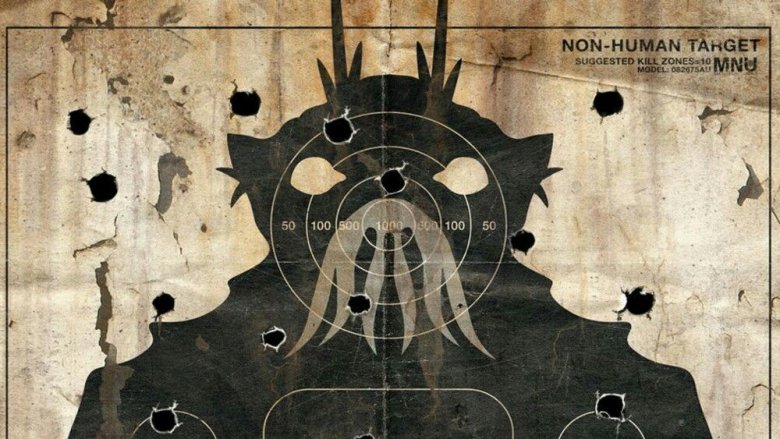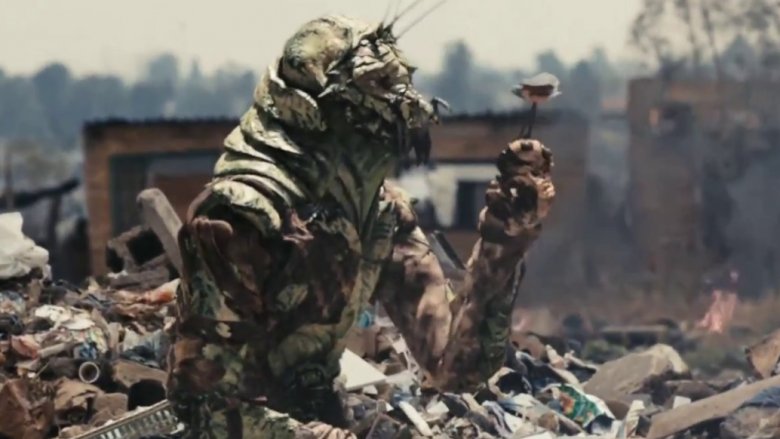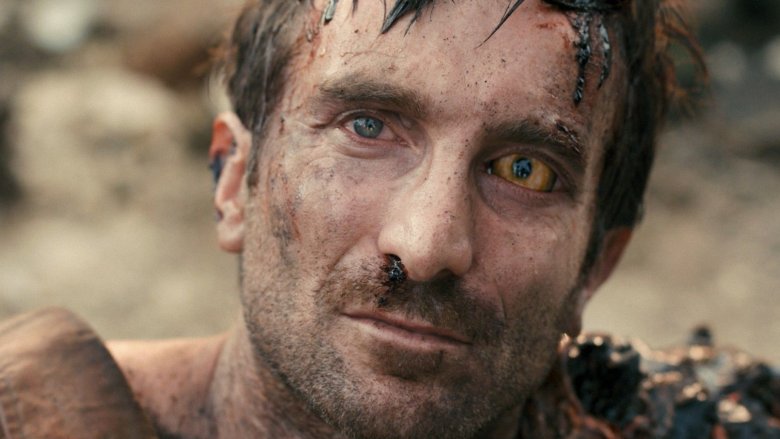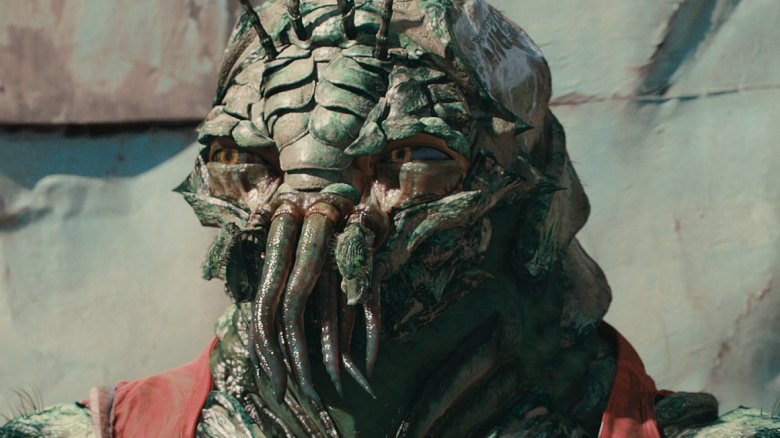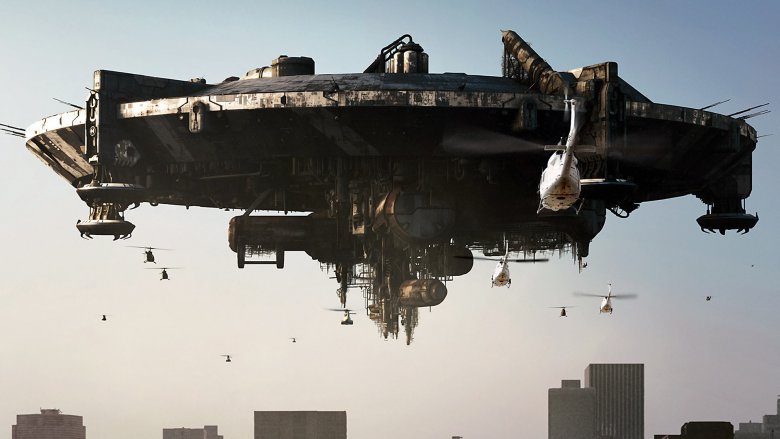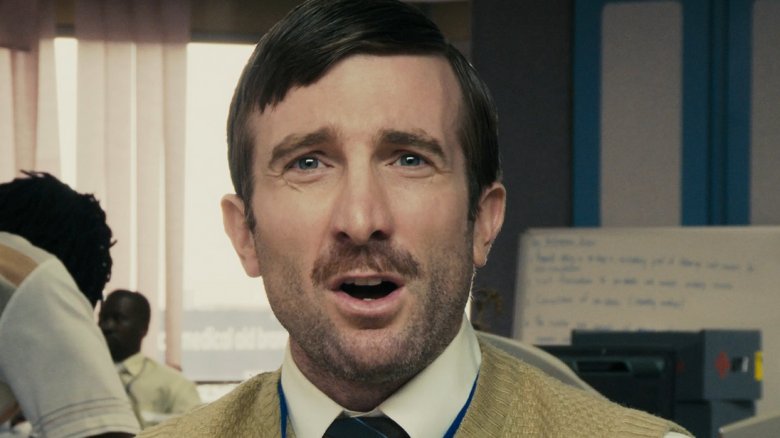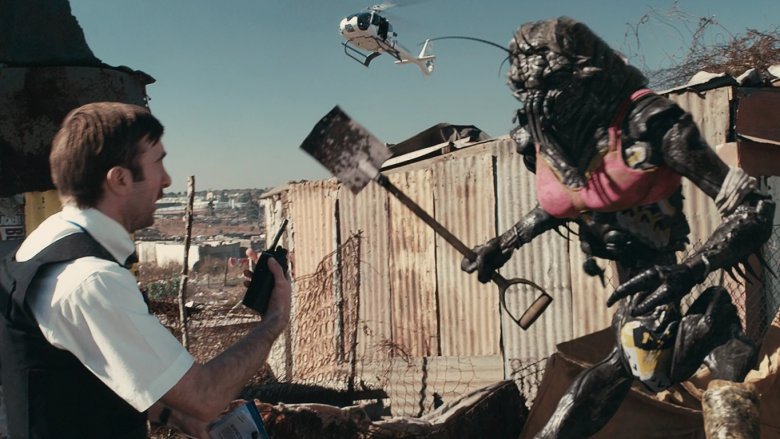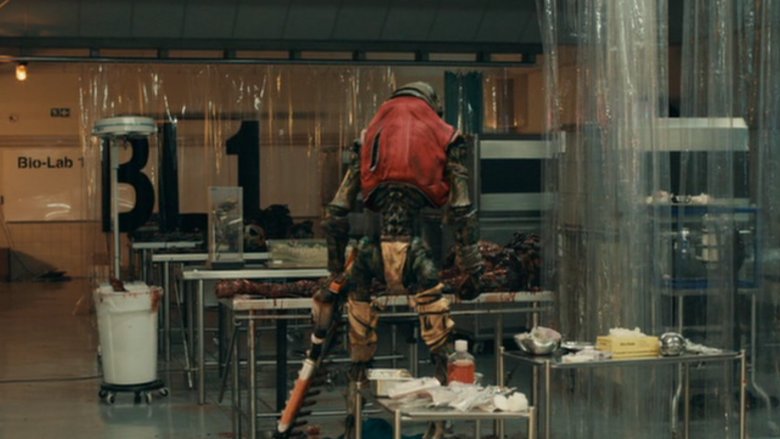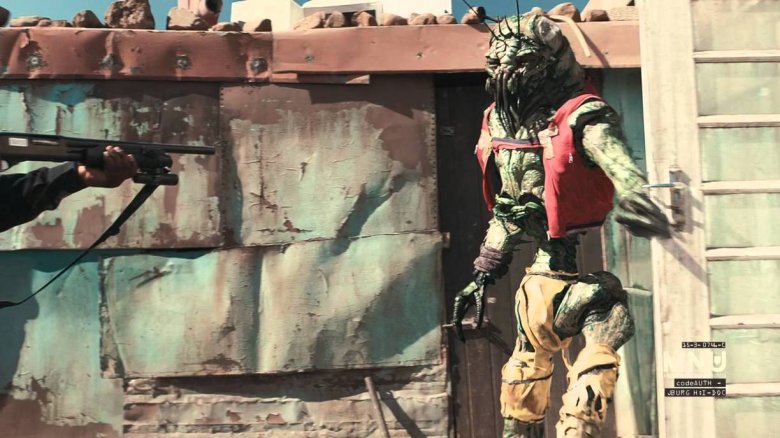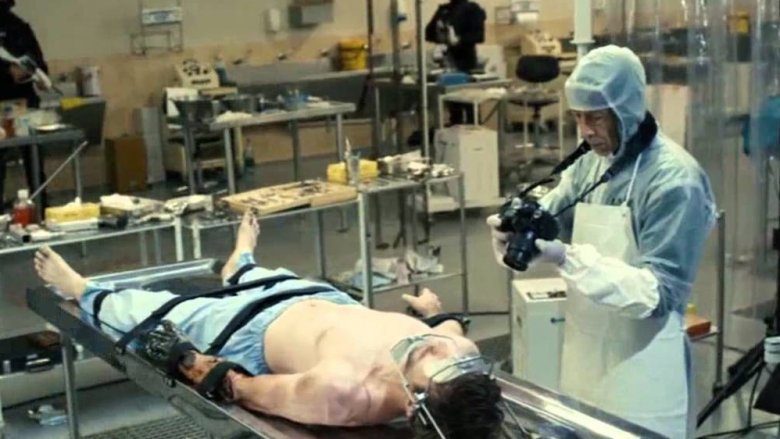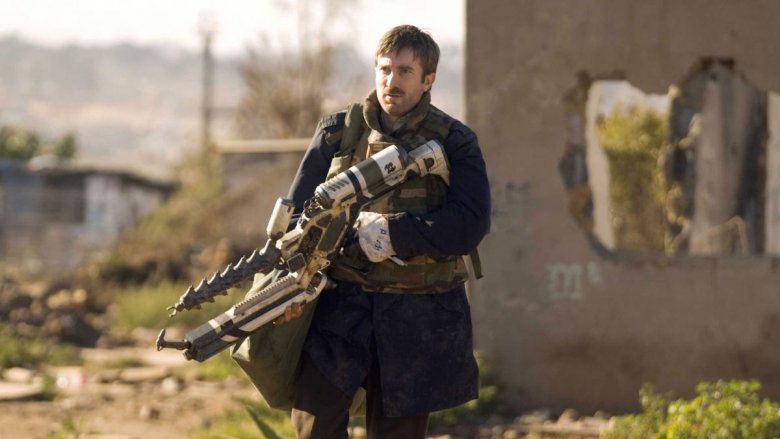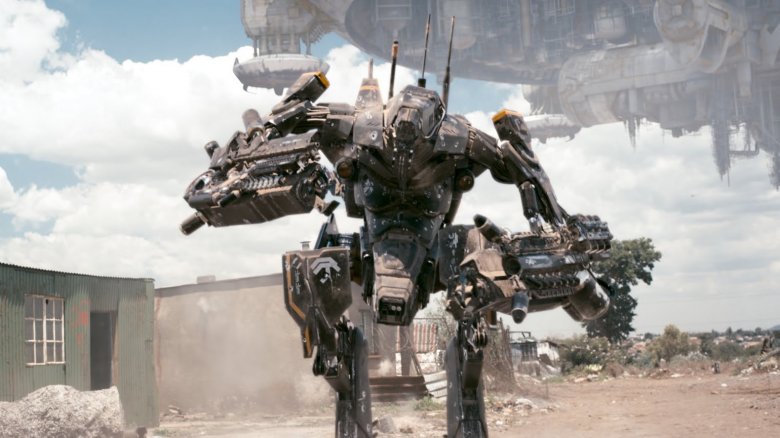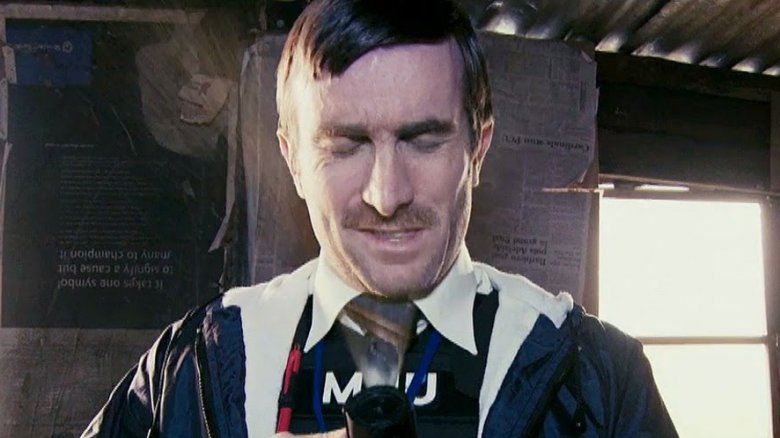District 9 Ending Explained
When District 9 arrived in theaters, audiences had no idea what to expect. The film was produced by Peter Jackson, but it sure didn't look like Lord of the Rings, and the actual director was an unknown talent named Neill Blomkamp who'd never released a feature film before. Furthermore, the marketing for the movie primarily involved promotional billboards plastered around major cities urging people to call a hotline if they'd seen any aliens. Even the trailer was ambiguous and shot documentary-style while containing little-to-no actual film footage. By the time we settled our butts into those cushy theater chairs, the only thing we knew for sure was District 9 would include aliens and South African accents.
So you can be excused for being utterly shocked by the whirlwind sci-fi adventure that unfolded through the film's two-hour runtime. By the time the credits roll, it's easy to forget all the little nuances and revelations explored throughout the film. And, of course, revisiting the climax could also help illuminate what Blomkamp might come up with next if he ever gets around to finally finishing District 10. To those ends, here's the ending of District 9 explained.
In case you're wondering, yes, spoilers.
Survival
Usually when a film concludes, audiences are treated to multiple powerful, soft-light shots of the hero kissing his love interest or hugging his relatives. If we're lucky, they'll even fist-pump the air in freeze frame. But District 9 has no such clear-cut heroic ending. In fact, given how much of the story revolves around Wikus van de Merwe slowly succumbing to a disease — and pulling out his freaking teeth — if you're not paying close attention you may wonder, "Is Wikus even alive? Is he lying in a ditch somewhere? Did the Nigerian mercenaries finally eat his body for magical powers?"
Well, don't worry. Wikus is very much alive at the conclusion of the film. Unfortunately, he's also very much an alien. We know this because Wikus' wife finds a metal flower made out of rubbish left on her front doorstep, which she believes may have come from Wikus. The very next shot is an alien making another rubbish flower. So either Wikus' wife has a secret admirer amongst the Prawn community, or Wikus himself is leaving her small tokens to let her know he's okay. We're thinking it's the latter.
More human than human
It's pretty clear Wikus becomes a full-on alien by the end of District 9, so it's fair to wonder if there's any scrap of humanity left. Throughout the film, Wikus slowly loses control of himself and acts in strange, alien ways. For example, his newfound insatiable desire to devour cat food isn't typical of most humans we know.
That said, the flower Wikus leaves his wife is as good an indication as any Wikus still clings to an element of his humanity. Earlier in the film, Wikus' wife explains that he loves making her fun craft projects like papier-mâché bowls. Alien-version Wikus still feels an urge to let his wife know he's generally doing okay and hasn't fully lost his personality — even if he's a little slimier than last time she saw him.
Additionally, if we look closely at Wikus post-transformation, it's clear that one of his eyes retains its blue, human color, while the other is green like those of the other Prawns. This would indicate there is still a small portion of Wikus that is still human and retains at least some human memories. He's certainly more Prawn than human, but he's still a bit human nonetheless.
A return voyage
In the end, Christopher — the Prawn Wikus fights alongside throughout the film — ultimately escapes the planet. Thanks to Wikus' sacrifice and assistance, Christopher is able to get his damaged command module working and fly himself and his son up to the recently activated mothership. Of course, the question becomes how long it'll be before Christopher is able to return to Earth. He promised to cure Wikus of his illness, after all. How long will Wikus be forced to wait?
Earlier in the film, Christopher convinces Wikus to help him by assuring him he can reverse Wikus' spreading disease. But after learning about the government's experimentation on his people, Christopher tells Wikus he needs to tell his people about what's happening before Christopher can dedicate the necessary time (and especially alien fuel) to heal Wikus. Instead of curing Wikus sometime in the near future, Christopher estimates it'll take him three years to make the trip to and from his home planet back to Earth. Christopher will return, but it's expected Wikus will be forced to live as a Prawn for at least three years until then.
A struggle to survive
When the Prawns arrived in Johannesburg in 1982, they were desperate and extremely malnourished. Whatever the aliens were searching for when they left on their expedition, it's clear there weren't many planets with useable resources between Earth and where they started from. Otherwise, they likely would have been able to stop at one of those planets and grabbed whatever their version of Taco Bell is. They landed at Earth because they were literally starving.
But it's not like that trip has gotten any easier. The journey to Christopher's home planet should take approximately a year and a half — again, the round trip is three years — and it's unlikely any new, resource-rich planets have popped up in the 30 years between the Prawns' original landing and this new excursion. Even worse, the mad rush to the ship at the end of the film guarantees Christopher and his son didn't exactly have time to pack a lunch.
It won't be long before the two find themselves low on resources and desperate for a cat food Happy Meal.
Back to normal?
It's fair to wonder if Christopher told Wikus he could cure his disease as a way to trick the man into helping him escape Earth. After all, how many times have humans sprayed alien fuel in their face and slowly, painfully turned into Prawns? Is there a standard procedure for reversing that almost certainly never-having-occurred-before situation? Although it's easy to see why some may be skeptical of Christopher's claims, his honesty later in the film gives us reason to believe he's telling the truth about his medical abilities.
After Christopher and Wikus discover the government's horrible experiments on the aliens, Christopher changes his plan and tells Wikus he actually needs to head home before healing Wikus. If that was Christopher's plan all along — lying to Wikus about a cure so Wikus would help Christopher get home — there'd be no reason to ever claim the plan needed to change. Christopher had to know Wikus would be upset by this new plan that would cause him to stay infected, and, in fact, that's exactly what happens when Wikus angrily attacks Christopher.
By being up front with his intentions and plan, it seems pretty clear that Christopher always intended to help Wikus. It's just that whatever the healing process is, it takes awhile to actually accomplish, and Christopher doesn't want any more aliens to suffer in the meantime. For him, time is of the essence.
A welcome worn out
As Christopher and his son fly away in their sweet mothership, several Johannesburgers (that's seriously what they're called) step outside to angrily wave the ship away as if to say, "Good riddance." The movie itself portrays the scene somewhat ambiguously (maybe they're happily waving goodbye?), but on the DVD commentary, director Blomkamp reveals the people in the scene were real-life citizens angrily waving away a helicopter during a labor dispute. The anger presented in those people fit District 9's scene perfectly.
The scene also speaks to a deeper issue present in the film. Nobody on either the Prawn nor the human side appears happy with the aliens' presence on Earth. It's the whole reasoning behind moving the aliens from District 9 to District 10 in the first place. This tension is in no way resolved by the film's conclusion. Wikus appears to be virtually the only human who understands or respects the Prawns. More clashes between the two groups seems inevitable.
Trouble on the horizon
Speaking of alien-on-human clashes, how excited do we think alien high command will be about Christopher's story? Even without the brutal torture and experimentation, aliens have been treated as second-class citizens and abused and manipulated by citizens of Earth for nearly three decades. We don't know much about alien culture, but we do know they have some pretty insanely powerful guns and exo-skeleton power suits. Considering their guns explode enemies into tiny pieces of meat, it's hard to imagine they used laser cannons only for hunting excursions with the boys. And who knows what other crazy weapons or bombs or ridiculously advanced technology the home planet might house?
Wikus may have slightly softened Christopher's opinion of humans, but clearly Christopher is still upset about what's happened to his people. Either way, there's no easy way to explain what's going on without the Prawn leadership becoming furious. If aliens return with any sort of vengeance, humanity is probably screwed.
Relocation
At the beginning of the film, the aliens are contained in a Johannesburg slum referred to as District 9. The aliens' proximity to the humans of the city creates endless friction. Sometimes the poverty-stricken aliens are coerced into crimes by gangs or suffer racial violence from their enraged human neighbors. Under the guise of humanitarian aid, the government moves the aliens to a new location outside the city limits — District 10.
The relocation effort goes poorly for Wikus as he contracts a crazy disease and is kidnapped by and experimented on by the government. But that doesn't mean the actual operation was a failure. It's easy to be so focused on Wikus' struggles that we miss how the aliens were actually successfully transferred to a new home. We don't know much about how the aliens acclimate to their new environment or if it actually solves any of the deep-rooted issues in the area, but we do know any possible sequel would likely connect to District 10 in some way.
Where there's a will...
Although the relocation effort is performed under the guise of humanitarian aid, the primary reason Multi-National United wants to evict the aliens is so they can sweep for weapons. MNU is the world's second largest weapons manufacturer in the world. And what could possibly be a better sales item than honest-to-God alien laser guns?
The problem, of course, is that alien guns don't fire for humans as they're DNA imprinted to only work with aliens. This is why MNU captures and experiments on aliens. They need a way to take their DNA and somehow give it to human operators who can fire these powerful weapons.
After Wikus blows up the lab and Christopher leaves on the mothership, there's no reason to expect those experiments to stop. In fact, they're likely to ramp up the activity as they now have proof of a human mixing their DNA with the Prawn somehow. The experiments will become worse, and MNU will probably at some point figure out a way to fire those alien weapons. That's not good.
A new hybrid
Another way MNU could figure out how to fire those weapons is to recapture Wikus. Because Wikus is now fully alien, he can presumably still fire those weapons, which could make kidnapping him exceptionally difficult. It's not that he'd necessarily feel the need or desire to use alien weapons again, but Wikus is dangerous in that he knows a great deal about humans work and operate, yet he's now fully invested now in the success of the Prawns. The only way he'll ever be cured is if the aliens agree to reverse the disease. He's no longer a friend of the MNU — especially after they released all those rumors about him contracting a sexually transmitted disease from the Prawn — so it's not that hard to imagine him using his abilities against the MNU in some way.
A new leader?
Many of the problems that arise throughout District 9 come from the Prawn's inherent lack of agency and leadership. One of the talking heads during the documentary segment explains how possibly due to disease or malnutrition or something else, the aliens have lost all sense of direction. As such, they're prone to addiction, listlessness, and general troublemaking.
This theory was later confirmed and elaborated on by Blomkamp himself. He explained in an interview the reason the Prawns never outright rebelled against the humans is because they lacked any form of central leadership or organization. They're inherently a hive-minded species, and whomever or whatever was in charge clearly died or was somehow lost during their mission to Earth.
That said, Blomkamp suggested the aliens would eventually evolve to find a new leader. Given that information, it's easy to assume the new alien leader could possibly be Christopher, given his ability to work independently and prepare complex plans. Of course, since the other Prawns rallied around Wikus at the end, it's also possible he could someday become that leader as well. If so, it's not crazy to believe Wikus could become the face of a rebellion in a future film — even before Christopher and the aliens return.
Mystery fuel
One of the largest unanswered questions in District 9 is why in the world alien fuel turns humans into Prawns. It's clear Wikus' transformation starts when the fluid is sprayed into his face, but nobody ever determines exactly why things go the way they do. Even weirder, Christopher doesn't seem at all confused when Wikus transforms. He immediately knows the fluid would do that and seems very confident the medical machines on the mothership could heal Wikus. Interestingly, it also appears alien fuel plays some role in healing humans, because Christopher says he needs all the available fuel to travel quickly, which is why it'll take awhile to heal Wikus.
It brings up several possible implications that could come up in future films. For example, could other humans accidentally become Prawns? Is there more alien technology containing the fluid out there amongst the trash heaps? Is it possible the Prawns themselves could weaponize the fluid in such a way as to transform all of humanity? There are just too many variables with that fluid the film never explores, and most of them don't bode well for humanity.
